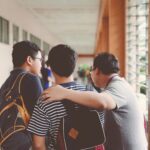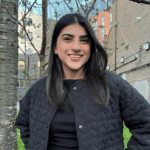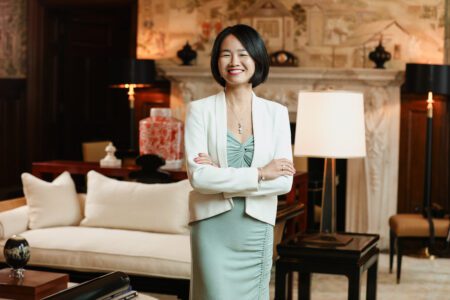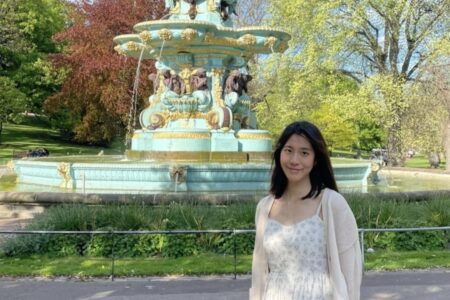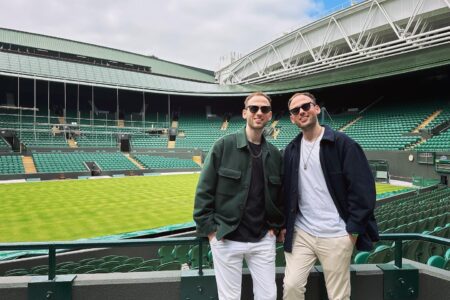
There’s a certain level of sentiment involved when choosing one’s degree, especially one that can help change a person’s life.
Take Lana Hendrawan, for example. She pursued an MSc in Radiobiology after witnessing several family members battle cancer, hoping to find ways to make the cancer treatment process more effective and less painful.
For Fidan Rasulzade, it was her sister who inspired her to move to the UK and complete an MA in Special Educational Needs at the University of Exeter.
“My master’s degree was a personal one,” she shares. “My older sister has cerebral palsy. I wanted to research and learn ways to create opportunities for her.”

Before pursuing her MA in Special Educational Needs, Rasulzade was an English teacher at three local schools in Azerbaijan. Source: Fidan Rasulzade
From teaching the English language to raising awareness for special educational needs
Born and raised in Azerbaijan, Rasulzade grew up multilingual, fluent in Azerbaijani, Turkic, and Russian. Yet, it was the English language that intrigued her.
“I love the English language,” she says. “Everyone in Azerbaijan knows a second language, Russian, as the country was part of the USSR in the past, but I wanted to be different and make myself more global.”
With that, she decided to master the English language.
Rasulzade became the top English language student at her high school, and eventually, ended up enrolling in a Bachelor of Applied Science in Education programme, specialising in English, at the Azerbaijan University of Languages (ADU) in 2018.
After graduating, she began teaching. Her first stint was as a teaching assistant at a national secondary school, Texniki Humanitaar Lisey, before becoming a general English teacher at Oxbridge Education Centre. Her last English and Literature teaching role was at another school, Muasir Innovasiyalar Liseyi.
It was in these classrooms that she began to notice some students were struggling to focus.
“I had three students who couldn’t concentrate and would make loud noises,” Rasulzade shares. “It was difficult for me and the other students, especially when I had no assistance. I didn’t understand what was happening or how to support them.”
At the time, she had little to no knowledge about teaching students with disabilities, particularly non-visible ones.
It wasn’t until her master’s studies that she realised some of her former students likely had hyperactivity disorders, and one may have been on the autism spectrum.
When people think of disabilities, they often picture visible conditions, like visual impairments, muscular dystrophy, amputations, multiple sclerosis, Parkinson’s disease, or cerebral palsy.
But many disabilities are not visible. These include depression, bipolar disorder, dementia, learning disabilities, diabetes, autism, or respiratory conditions — all legally recognised as disabilities in countries like the UK, the US, and Canada.
In Azerbaijan, where approximately 560,000 people live with disabilities — 10% of whom are children — that recognition is still lacking.
“People here just see it as a limitation, not a disability,” says Rasulzade. “They don’t even have inclusive education for students who need special care or a formulated way of teaching.”
UNESCO describes inclusive education as an approach that takes each individual’s needs into account, and all learners can achieve goals together. It also promotes gender equality, bridging the difference in values, and eliminates all forms of discrimination.
The lack of awareness about disabilities extends beyond the classroom too, Rasulzade noticed — it happens in the streets of Azerbaijan.
“When we’re out, people stare at my sister with pity,” she shares. “It made me angry. I didn’t like how people looked at her; it was as if she were a tragedy. They don’t realise that there are people with hidden disabilities too.”
For Rasulzade, this ignorance could not go on.
Her solution? Pursuing a master’s in special educational needs to change the minds of Azerbaijanis for the better.

Rasulzade’s sister (left) is the one who inspired Rasulzade (right) to pursue an MA in Special Educational Needs abroad. Source: Fidan Rasulzade
Sisterly love, secret applications, and eye-opening experiences
Love can take us places, and the love between siblings even more so. It forms a unique foundation of trust, support, and understanding, even during difficult times.
For Rasulzade, her sister has always been her guiding light.
“I love my sister,” she says. “She may have cerebral palsy, but she’s incredibly thoughtful. She loves literature, history, and political talks. She’s so knowledgeable. She’s amazing.”
But the world hasn’t always welcomed her sister’s brilliance.
“There are so many things that stop her from doing what she loves,” says Rasulzade. “I even noticed that she doesn’t have a lot of friends because society isn’t inclusive, and I needed to change that.”
When Rasulzade informed her parents about her plan to study abroad, they opposed the idea.
“I applied for the MA in Special Educational Needs and I did not inform anyone around me, not even my parents,” says Rasulzade. “When they found out, they were against studying abroad. They were also afraid that something might happen to me when I’m abroad alone.”
But Rasulzade wasn’t swayed — she knew change was needed, and she would achieve it, somehow, someway.
“I wanted to learn more and become somebody different,” she says. “I wanted to get out of my comfort zone. It’s my life, and I want to take responsibility for it. I don’t want to feel like I’ll regret it years later.”

Rasulzade graduated in September 2024 with a distinction. Source: Fidan Rasulzade
During her research for universities with an MA in Special Educational Needs, Rasulzade came across the University of Exeter, one of the top 200 universities in the world according to QS World University Rankings 2025.
Better yet, several friends were already studying there, and she found that Exeter and the UK at large offered better post-graduation prospects.
“There was a one-year scholarship programme for Azerbaijanis to study in the UK, but since my parents disapproved, I applied secretly,” says Rasulzade.
And just like that, a chance application kickstarted a new chapter for Rasulzade. She won the scholarship and was ready to tackle her programme.
In Rasulzade’s words, it was a transformative experience.
“One day, I saw a girl in a wheelchair moving through town, and no one was staring at her,” she says. “The girl was just minding her own business, and nobody was staring at her. It was so bizarre because that wouldn’t happen in Azerbaijan.”
Back home, it’s rare to see people with disabilities in public spaces — the infrastructure just isn’t designed for them.
In Azerbaijan’s capital city of Baku, the metro is almost impossible to navigate with a wheelchair.
Even Nasimi Pashayev, the PR head of Baku Metro, agrees. “It’s against safety regulations to use a wheelchair on the escalators,” said Pashayev in an interview with OC Media. “Installing lifts in deeper stations isn’t possible due to the lack of space.”
This realisation hit Rasulzade hard: her sister had missed many opportunities, including attending university, simply because of a lack of awareness and policies in place for people with disabilities.
And while Rasulzade’s time in the UK was fruitful — she experienced a growing sense of guilt too.
“Lecture after lecture, I realised that so many opportunities were taken away from my sister,” she says. “She doesn’t have that many friends, and she doesn’t really leave the house. She doesn’t get to do what ‘normal’ people can do, like go out whenever we want and talk to whoever we want.”
She wanted her sister to experience the kind of inclusivity she felt while in the UK — to know what it felt like to be seen and supported.

Rasulzade participated in the ASAN Innovative Development Centre’s forum for young minds to learn about personal innovation, growth and marketing. Source: Fidan Rasulzade
How to change the mind of millions with an MA in Special Educational Needs
When it came time to choose Rasulzade’s MA thesis in Special Educational Needs, it was simple.
“My coursemates were focusing on special educational needs in the UK, but I wanted to do something unique and something that no one has done,” she shares. “So I decided to dedicate my thesis to my sister: exploring the social attitudes towards cerebral palsy in Azerbaijan.”
It wasn’t easy. At times, Rasulzade doubted her decision. Finding resources to support her thesis also proved to be a challenge.
And when she felt like her thesis was a lost cause, help came from an unexpected source.
“I had to look for interviewees for my thesis, but I didn’t know where to start,” says Rasulzade. “My parents stepped in and connected me with people who have cerebral palsy. It helped me branch the research since I had limited resources.”
In late 2024, Rasulazade graduated from the University of Exeter with distinction.
Today, she is back in Azerbaijan, working as a Training and Development Specialist at the Ministry of Science and Education.
Rasulazade hosts trainings for teachers in inclusive education and advises the ministry on policy and understanding around special needs.
“There aren’t many specialists in the field, so I help the people in my department understand research and data sets,” she shares. “People often misunderstand what special needs education involves.”
Thanks to her contribution, thre has also been an increase in inclusive classrooms in mainstream schools.
Beyond her work at the ministry, she also represents Azerbaijan at events like the International Autism Conference, where professionals and experts from around the world come together to speak about current research, practices, and innovations in autism support and inclusive education.
And the best part? Her parents, who once objected to her decision to pursue her MA in Special Educational Needs, are now her biggest supporters.
“They’re proud of me because I came back home, shared my knowledge, and helped others understand what disabilities are and the importance of inclusive education,” Rasulzade says. “They now see how it’s improving lives, especially my sister’s.”




